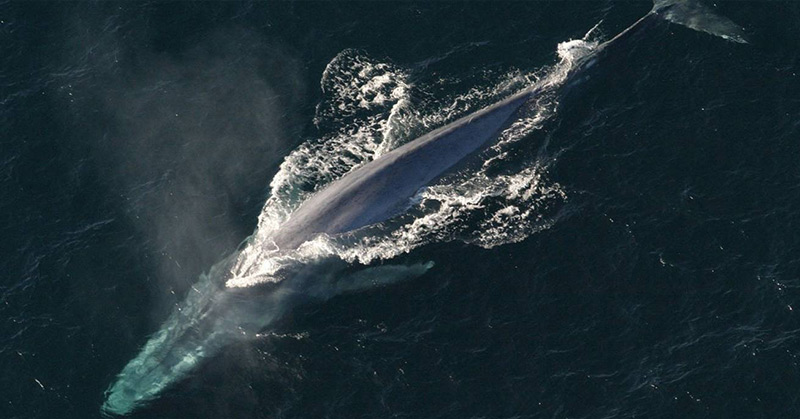There’s no doubt that humanity has had a detrimental impact on our planet’s wildlife. Sadly, scientists now estimate that human activity has caused the death of 86 percent of all wildlife and half of all plants.
Statistics like these are not just disheartening- they are downright devastating. While Mountain lions, antelope, bald eagles, lions, and countless other species are seeing a continual drop in numbers from environmental damage caused by humans, trophy hunting, and poaching, however, there is one animal that looks like it’s making a comeback.
Blue Whales Return
Blue whales, despite being on the verge of extinction, have made a miraculous recovery. In recent years, the world’s largest animal has seen a 97 percent drop in population numbers, but a new report from the British Antarctic Survey (BAS) has found an “unprecedented” number of whales in South Georgia [1,2].
“After three years of surveys, we are thrilled to see so many whales visiting South Georgia to feed again,” said whale project leader Dr. Jennifer Jackson. “This is a place where both whaling and sealing were carried out extensively.” [1]
Read: Once Nearly Dead As The Dodo, California Condor Comeback Reaches 1,000 Chicks
A Hunted Animal
Blue whale populations have been devastated in the last century as a result of extremely aggressive hunting. Their blubber and baleen were valuable commodities, and new technologies developed in the late nineteenth and early twentieth century turned whaling into a multi-million dollar industry. For this reason, some scientists estimate that more whales were hunted at the beginning of the twentieth century than in the previous four centuries combined [3].
In the last sixty years, 176 thousand whales have been killed for their blubber and their meat, which has now landed them on the World Wildlife Fund’s (WWF) endangered species list [1,2].
Once kerosene, petroleum, and other fossil fuels replaced whale blubber in popularity, the industry fell sharply. The United States officially outlawed whaling in 1971 [3].
The IWC
Several countries joined together in 1946 to establish the International Whaling Commission (IWC) with the purpose of preventing the overhunting of whales. In 1986, the IWC established a moratorium that banned commercial whaling, however, Iceland and Norway lodged official objections to the ban and continued the practice [3,4].
Both Japan and Iceland have continued to hunt whales using the “scientific permit” exemption. The result is that nearly 32 thousand whales have still been killed since the moratorium was passed [4].
Scientific Whaling
The “scientific permit” exemption allows whalers to continue to hunt for the purpose of scientific study. Some stipulations of the permit are as follows:
- Any whales taken under these special permits shall so far as practicable be processed and the proceeds shall be dealt with in accordance with directions issued by the Government by which the permit was granted.
- Each Contracting Government shall transmit to such body as may be designated by the Commission, in so far as practicable, and at intervals of not more than one year, scientific information available to that Government with respect to whales and whaling, including the results of research conducted pursuant to paragraph 1 of this Article and to Article IV [5].
This means that whales can still be taken for their meat and their products can be sold commercially, and Japan has been accused of using the moratorium as a way around the ban [6].
Read: Enormous Humpback Whale Filmed Jumping Next To A Fishing Boat
The WWF Condemn Commercial Whaling
In 2018, the BAS reported that only one blue whale was seen, compared with this year in which 55 blue whales were seen [1]. The news that blue whale populations are on the rise is very encouraging, but the reality is that the animal is still endangered.
Iceland resumed commercial whaling in 2006, and despite having a “scientific permit”, Japan officially resumed the practice this past June [1,7].
Because whales are so massive and travel great distances, protecting them requires international cooperation. Japan has officially removed itself from the IWC and argues that it is possible to sustainably hunt whales, regardless of the fact that they are endangered. The WWF and the IWC, however, maintain their stance against commercial whaling [1].
- https://www.unilad.co.uk/news/blue-whales-bouncing-back-from-brink-of-extinction-after-decades-of-decline/
- https://www.worldwildlife.org/species/blue-whale
- https://www.nationalgeographic.org/article/big-fish-history-whaling/
- https://wwf.panda.org/knowledge_hub/endangered_species/cetaceans/threats/whaling/whales_killed/
- https://iwc.int/permits
- https://wwf.panda.org/knowledge_hub/endangered_species/cetaceans/threats/whaling/
- https://www.bbc.com/news/world-asia-48821797

